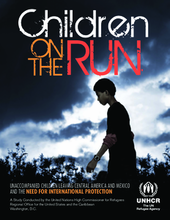This report, issued by the United Nations High Commissioner for Refugees, examines the situation and needs of unaccompanied children who emigrate from Central America and Mexico to the United States, and offers recommendations based on those needs. The report also features demographic information, including the age, gender, family structure, language, education, and country/region of origin of these unaccompanied migrant children.
Four hundred and four children were interviewed in this study and asked to share their reasons for leaving their countries of origin. The most common responses from the children were: violence in society, deprivation, abuse in the home, to reunite with family, or for greater opportunity. Children reported witnessing murders, evading extortion, navigating threats from organized armed criminal actors, and recruitment into the human smuggling industry in their countries of origin. From this study, the UNHCR has determined that there is a great need for “international protection” for many of these children coming to the United States from El Salvador, Guatemala, Honduras, and Mexico. This means that, because these children leave their countries of origin due to a lack of protection of their rights, it is the responsibility of the international community to ensure those rights are protected.
Based on the need for international protection, the UNHCR offers 13 points of recommendations to the governments of El Salvador, Guatemala, Honduras, Mexico, and the United States, which are clustered around these three primary themes:
- Recognize newly emerging forms of displacement in Central America and the emergence of international protection issues - recognizing that violence and insecurity within these Central American countries and Mexico have led to the displacement of children in the region and there is a need to ensure the safety of these children.
- Strengthen and harmonize regional and national frameworks for international protection – establishing and implementing uniform responses and approaches to addressing these unaccompanied children and their needs (with the best interests of the child in mind), enhancing capacity for response, developing and disseminating tools to support government bodies in addressing this issue, and developing and implementing mandatory training for staff persons working with unaccompanied children.
- Address Root Causes – making efforts to reduce or eliminate the factors that lead to forced displacement, including widespread violence and insecurity.
In addition to the report, this paper also outlines the Child Asylum Claims under Articles 1(A)2 and 1(F) of the 1951 Convention and/or 1967 Protocol relating to the Status of Refugees as well as the UNHCR Guidance Note on Refugee Claims Relating to Victims of Organized Gangs.

